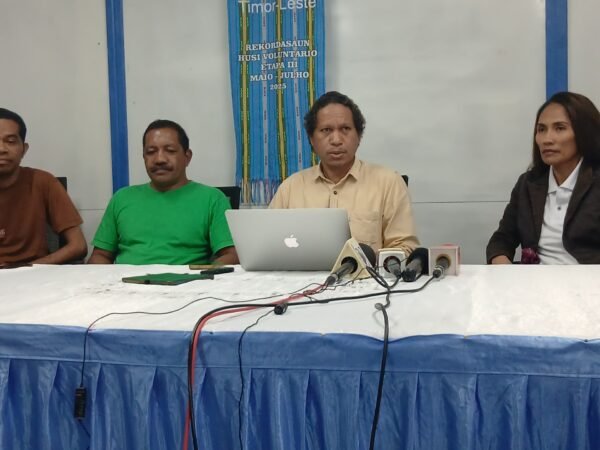Dili, 5 August 2025 (Média Democracia) – The Judicial System Monitoring Program (JSMP) appreciates and congratulates the collective judges of the Court of Appeal (Tribunál Rekursu – TR) who, in accordance with the Constitution and the law, have assumed the constitutional and electoral competencies of the Supreme Court of Justice (STJ) as stipulated in Article 126 of the Constitution. This was conveyed in a press conference held at the JSMP office on Monday of this week.
In the statement delivered by JSMP spokesperson and legal researcher Luis Sampaio, he explained that in this context, the judges demonstrated their quality of service and exercised their competencies independently, basing their actions strictly on the law and the Constitution, as guaranteed under Article 119 of the Constitution.
“The TR exercises their competencies regarding the STJ on a temporary or transitional basis, as provided for in point 2) of Article 164 of the Constitution, which states that until the STJ is formally established, the relevant powers and responsibilities of the STJ shall be carried out by the TR. The decision issued by the TR on 31 July 2025 reaffirms JSMP’s previously presented legal and constitutional perspective that the appointment of the current President of the Court of Appeal constitutes a breach or violation of constitutional norms regarding the legal requirements of the appointment process for the President of the Court of Appeal who is simultaneously assuming the role of President of the Supreme Court of Justice,” said Luis Sampaio, JSMP spokesperson and legal researcher.
These requirements are outlined in point 3) of Article 124 of the Constitution concerning the STJ, which states that the President of the STJ shall be appointed from among its judges by the President of the Republic for a four-year mandate.
“This TR decision serves as proof of a commitment to uphold the principles of a Democratic Rule of Law State, affirming that all decisions must be in accordance with the Constitution and the law. Furthermore, this marks a political test for all sovereign bodies in how they prioritize the interests of the state and the justice system over other interests,” continued JSMP spokesperson Luis Sampaio.
The spokesperson also stated that the decision reflects and reaffirms the constitutional movement promoted earlier by the IX Constitutional Government and the current President of the Republic during the electoral campaign around the key theme of “Restoring Constitutional Order,” which remains a strategic and relevant issue in a democratic state.
“The final decision of the Court is binding, as stipulated in point 3) of Article 118 of the Constitution, which defines that court decisions override those of other authorities and must be obligatorily complied with. In this context, the TR decision regarding unconstitutionality cannot be treated as an appealable decision like a regular case, nor can it be subject to legal review as in the case of a political veto by the President of the Republic over legislation submitted by the National Parliament for promulgation,” explained JSMP legal researcher Luis Sampaio.
JSMP believes that the President of the Republic, the current President of the Court of Appeal, and other sovereign bodies and relevant entities will place the interests of the state above all else and comply with the court’s decision regarding the matter of unconstitutionality declared by the Court of Appeal judges concerning the appointment of the President of the Court of Appeal.
In particular, JSMP strongly believes that the current President of the Court of Appeal will demonstrate goodwill, moral and civic consciousness, and professional ethics to collaborate and comply with the court’s order, as a supreme mandate in a democratic state enshrined in the Constitution, serving as an important political lesson for the people and the state.
JSMP reaffirms that, especially judges and judicial authorities, must lead the way in showing society and the state that court decisions are binding and final, thereby strengthening public trust in the justice sector. On the other hand, any normative or legislative act declared unconstitutional or void by the STJ/TR shall have no legal effect and shall cease to be in force.
JSMP also takes this opportunity to call on the Government to prioritize the establishment of the STJ in order to prevent similar issues in the future. JSMP views this case as a major lesson that all relevant parties must learn from and take steps to ensure such situations are not repeated.
Report: JSMP Press Conference
Photo: Domingas

